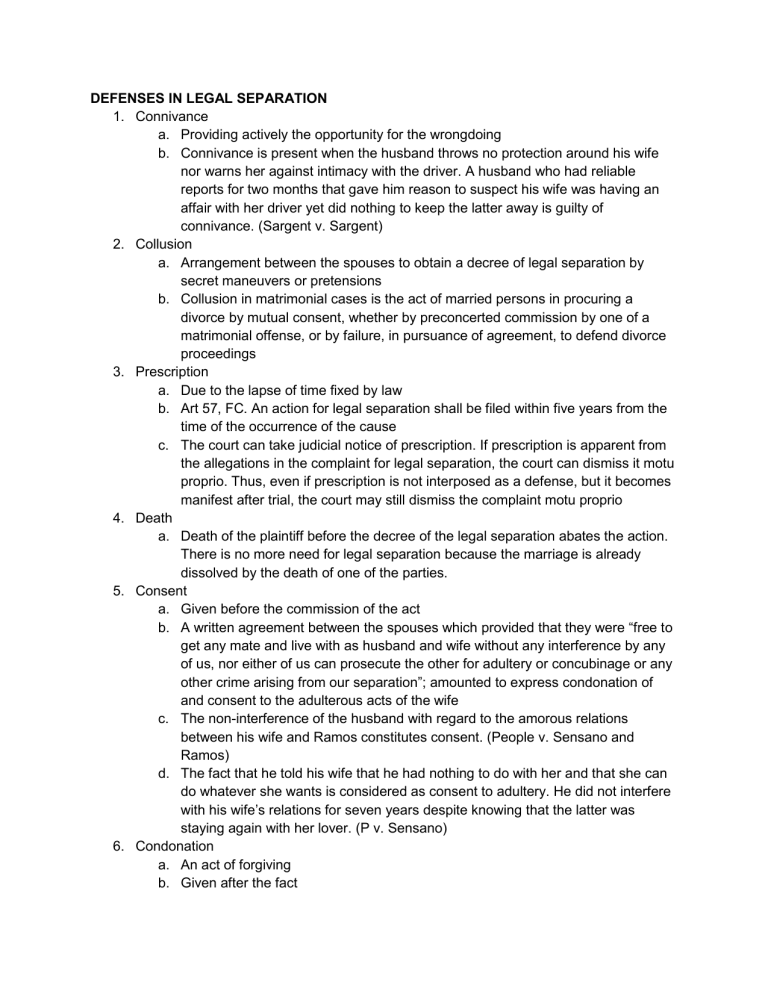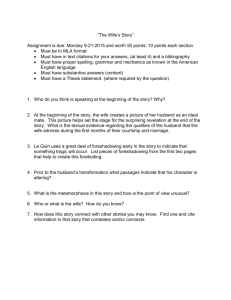
DEFENSES IN LEGAL SEPARATION 1. Connivance a. Providing actively the opportunity for the wrongdoing b. Connivance is present when the husband throws no protection around his wife nor warns her against intimacy with the driver. A husband who had reliable reports for two months that gave him reason to suspect his wife was having an affair with her driver yet did nothing to keep the latter away is guilty of connivance. (Sargent v. Sargent) 2. Collusion a. Arrangement between the spouses to obtain a decree of legal separation by secret maneuvers or pretensions b. Collusion in matrimonial cases is the act of married persons in procuring a divorce by mutual consent, whether by preconcerted commission by one of a matrimonial offense, or by failure, in pursuance of agreement, to defend divorce proceedings 3. Prescription a. Due to the lapse of time fixed by law b. Art 57, FC. An action for legal separation shall be filed within five years from the time of the occurrence of the cause c. The court can take judicial notice of prescription. If prescription is apparent from the allegations in the complaint for legal separation, the court can dismiss it motu proprio. Thus, even if prescription is not interposed as a defense, but it becomes manifest after trial, the court may still dismiss the complaint motu proprio 4. Death a. Death of the plaintiff before the decree of the legal separation abates the action. There is no more need for legal separation because the marriage is already dissolved by the death of one of the parties. 5. Consent a. Given before the commission of the act b. A written agreement between the spouses which provided that they were “free to get any mate and live with as husband and wife without any interference by any of us, nor either of us can prosecute the other for adultery or concubinage or any other crime arising from our separation”; amounted to express condonation of and consent to the adulterous acts of the wife c. The non-interference of the husband with regard to the amorous relations between his wife and Ramos constitutes consent. (People v. Sensano and Ramos) d. The fact that he told his wife that he had nothing to do with her and that she can do whatever she wants is considered as consent to adultery. He did not interfere with his wife’s relations for seven years despite knowing that the latter was staying again with her lover. (P v. Sensano) 6. Condonation a. An act of forgiving b. Given after the fact c. Express d. Implied i. When a husband repeatedly has intercourse with the wife despite the wife’s cruelty. “Although he did not wish it, he did it eventually for the sake of peace.” (Willan v. Willan) ii. The act of giving money to an erring wife and the fact proven in the case that no action was taken against her before the courts of justice are sufficient to establish forgiveness amounting to condonation. For condonation is the forgiveness of one of the married parties of an offense which he knows the other has committed against the other. (Almacen v. Baltazar) iii. Any cohabitation with the guilty party, after the commission of the offense, and with the knowledge or belief on the part of the injured party of its commission, will amount to conclusive evidence of condonation; but this presumption may be rebutted by evidence. (Bugayong v. Gines) 7. Mutual Guilt a. Where both parties have given ground for legal separation 8. Reconciliation a. Restoration of marital relations b. Article 65, FC, If the spouses should reconcile a corresponding joint manifestation under oath duly signed by them shall be filed with the court in the same proceeding for legal separation c. Determined at whatever stage d. Final decree of separation shall be set aside e. The separation of property and forfeiture of shares of the guilty spouse shall subsist unless the spouses agree to revive their former property regime or to institute another property regime f. Joint custody of children is restored g. The right to intestate succession by guilty spouse from innocent spouse is restored h. The right to testamentary succession depends on the will of the innocent spouse



